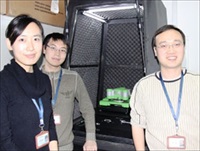Channels
Special Offers & Promotions
JPK reports on the use of the ForceRobot system to study the dynamics of biomacromolecules at Nanjing University
JPK Instruments reports on the study of how force regulates the structures and conformational dynamics of biomacromolecules using AFM-based single molecule force spectroscopy.
 JPK Instruments, a world-leading manufacturer of nanoanalytic instrumentation for research in life sciences and soft matter, reports on the study of how force regulates the structures and conformational dynamics of biomacromolecules using AFM-based single molecule force spectroscopy, a project of Professor Yi Cao of Nanjing University.
JPK Instruments, a world-leading manufacturer of nanoanalytic instrumentation for research in life sciences and soft matter, reports on the study of how force regulates the structures and conformational dynamics of biomacromolecules using AFM-based single molecule force spectroscopy, a project of Professor Yi Cao of Nanjing University.
Professor Yi Cao is a member of the Institute of Biophysics located in the Physics Department of Nanjing University. The main focus of his group is to study how force regulates the structures and conformational dynamics of biomacromolecules using AFM based single molecule force spectroscopy. As force has been revealed as an important signal that regulates many biologic processes (e.g. cell adhesion, muscle contraction, membrane fusion and etc.), their study will be helpful for the understanding of the mechanism underlying these processes. In order to study the conformational change of proteins under force, there is the need for a tool that allows the accurate application of force in the pN range and then to measure the change in distance at the nm resolution. AFM is an ideal tool to fulfil this criterion and Professor Cao thinks that JPK’s AFM is one of the best AFMs for biological applications.
Professor Cao first got to know ForceRobot when he was a graduate student at the University of British Columbia in Canada. He notes “I saw the very first version of ForceRobot in a SPM conference in 2007. It was so amazing to get the experiments done automatically without attendance using the ForceRobot®. I thought that this could save a lot of tedious routine manipulation time. I was impressed that the machine can be controlled remotely through internet or smartphone, which means that the operator can leave experiments running when at home or away from the laboratory. I can change many experimental parameters using the Experimentplanner™. Then, when I come back to work, thousands of curves have been collected. All you need to do is to analyze them and think about the science related to these data. Subsequently, I bought a ForceRobot when I started my own research group in Nanjing University in 2010. The software is getting better and better, especially the data analysis function.”
Continuing, Professor Cao said that “before using ForceRobot, I used a custom-built AFM (commercial heads and piezos). We need to spend quite a lot of time for instrumentation and sometimes the custom-built AFM gave us more flexibility for different kinds of experiments. With the advent of the ForceRobot, we have a system which greatly improves the quantity and quality of data.”
more about JPK's ForceRobot® system
Media Partners


